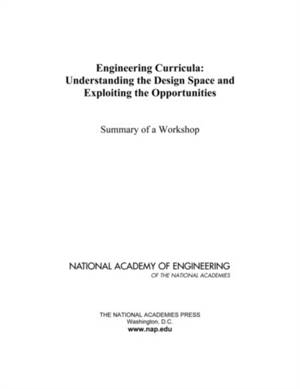
- Afhalen na 1 uur in een winkel met voorraad
- Gratis thuislevering in België vanaf € 30
- Ruim aanbod met 7 miljoen producten
- Afhalen na 1 uur in een winkel met voorraad
- Gratis thuislevering in België vanaf € 30
- Ruim aanbod met 7 miljoen producten
Zoeken
Engineering Curricula
Understanding the Design Space and Exploiting the Opportunities: Summary of a Workshop
National Academy of Engineering
Paperback | Engels
€ 42,95
+ 85 punten
Omschrijving
In April 2009 a workshop was held to explore how engineering curricula could be enhanced to better prepare future engineers. The workshop, summarized in this volume, included individuals from industry, academia, government agencies, and professional societies.
During the workshop participants addressed the rationale for the scope and sequence of current engineering curricula, considering both the positive aspects as well as those aspects that have outlived their usefulness. Other topics of discussion included the potential to enhance engineering curricula through creative uses of instructional technologies; the importance of inquiry-based activities as well as authentic learning experiences grounded in real world contexts; and the opportunities provided by looking more deeply at what personal and professional outcomes result from studying engineering.
General themes that appeared to underlie the workshop attendees' discussions included desires to (a) restructure engineering curricula to focus on inductive teaching and learning, (b) apply integrated, just-in-time learning of relevant topics across STEM fields, and (c) make more extensive use and implementation of learning technologies. During breakout discussions, many additional suggestions were offered for means by which to facilitate curricular innovation.
During the workshop participants addressed the rationale for the scope and sequence of current engineering curricula, considering both the positive aspects as well as those aspects that have outlived their usefulness. Other topics of discussion included the potential to enhance engineering curricula through creative uses of instructional technologies; the importance of inquiry-based activities as well as authentic learning experiences grounded in real world contexts; and the opportunities provided by looking more deeply at what personal and professional outcomes result from studying engineering.
General themes that appeared to underlie the workshop attendees' discussions included desires to (a) restructure engineering curricula to focus on inductive teaching and learning, (b) apply integrated, just-in-time learning of relevant topics across STEM fields, and (c) make more extensive use and implementation of learning technologies. During breakout discussions, many additional suggestions were offered for means by which to facilitate curricular innovation.
Specificaties
Betrokkenen
- Auteur(s):
- Uitgeverij:
Inhoud
- Aantal bladzijden:
- 36
- Taal:
- Engels
Eigenschappen
- Productcode (EAN):
- 9780309148313
- Verschijningsdatum:
- 24/01/2010
- Uitvoering:
- Paperback
- Formaat:
- Trade paperback (VS)
- Afmetingen:
- 216 mm x 279 mm

Alleen bij Standaard Boekhandel
+ 85 punten op je klantenkaart van Standaard Boekhandel
Beoordelingen
We publiceren alleen reviews die voldoen aan de voorwaarden voor reviews. Bekijk onze voorwaarden voor reviews.








